In a shocking turn of events, Richard Glossip, an Oklahoma death row inmate, is facing yet another murder trial despite being on the brink of exoneration mere months ago. This unexpected development has left many questioning the justice system and the motives behind keeping Glossip behind bars.
Glossip’s case has been a highly controversial one, with many believing in his innocence and advocating for his release. The 57-year-old has been on death row for over two decades for the murder of his former boss, Barry Van Treese. However, there has always been a lack of physical evidence linking Glossip to the crime, and his conviction was primarily based on the testimony of his co-defendant, Justin Sneed, who claimed Glossip had hired him to commit the murder.
Despite the lack of evidence, Glossip has faced two trials and narrowly escaped execution twice. In 2015, he was just hours away from being put to death when the state of Oklahoma granted him a last-minute stay of execution. This was due to the discovery of new evidence, including a signed affidavit from Sneed recanting his testimony and stating that he had acted alone in the murder. This development gave hope to Glossip and his supporters, who believed that justice would finally be served.
However, the recent decision by Oklahoma County District Judge Ray Elliott to deny Glossip’s request for a new trial has left many baffled and outraged. Despite the overwhelming evidence pointing towards Glossip’s innocence, Judge Elliott chose to side with the prosecution and keep Glossip behind bars. This decision has been heavily criticized by legal experts and activists, who believe that the judge’s ruling was influenced by politics rather than the pursuit of justice.
One of the main arguments used by the prosecution to keep Glossip in jail was the theory of “accomplice liability.” They claimed that even if Glossip did not physically commit the murder, he was still responsible for it because he had hired Sneed to carry out the act. This argument has been widely discredited by legal experts, who argue that there is no evidence to support the theory and that it goes against the principles of justice.
Moreover, the prosecution’s case against Glossip has been riddled with inconsistencies and contradictions. The state’s key witness, Justin Sneed, has changed his story multiple times, and his credibility has been called into question. In addition, the state’s evidence against Glossip has been largely circumstantial, with no concrete proof linking him to the crime. Despite this, the prosecution has continued to push for Glossip’s conviction, raising doubts about their true intentions.
The decision to deny Glossip a new trial has sparked outrage and protests from his supporters, who believe that he is a victim of a flawed justice system. The case has also gained international attention, with many human rights organizations condemning the state of Oklahoma for its handling of the case. The fact that Glossip has already spent over two decades on death row, facing the constant threat of execution, only adds to the injustice of the situation.
It is clear that Richard Glossip’s case is a prime example of the flaws and biases present in the justice system. Despite the overwhelming evidence pointing towards his innocence, he continues to face an uphill battle for his freedom. The decision to deny him a new trial is a blow to the pursuit of justice and a disservice to the victim, Barry Van Treese, whose true killer remains unpunished.
In the face of this injustice, it is important to continue to advocate for Richard Glossip and others like him who have been failed by the justice system. The fight for justice and fairness must continue, and we must not let the prosecution’s discredited arguments and political agendas prevail. It is time for the state of Oklahoma to acknowledge their mistake and grant Richard Glossip the fair trial he deserves. Only then can true justice be served.






